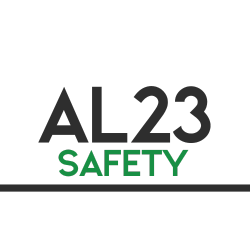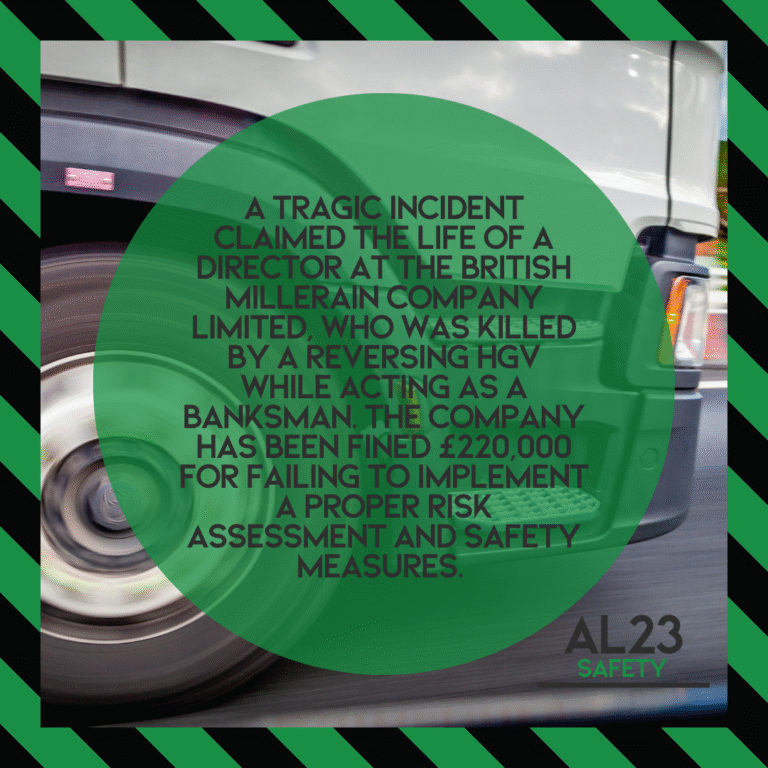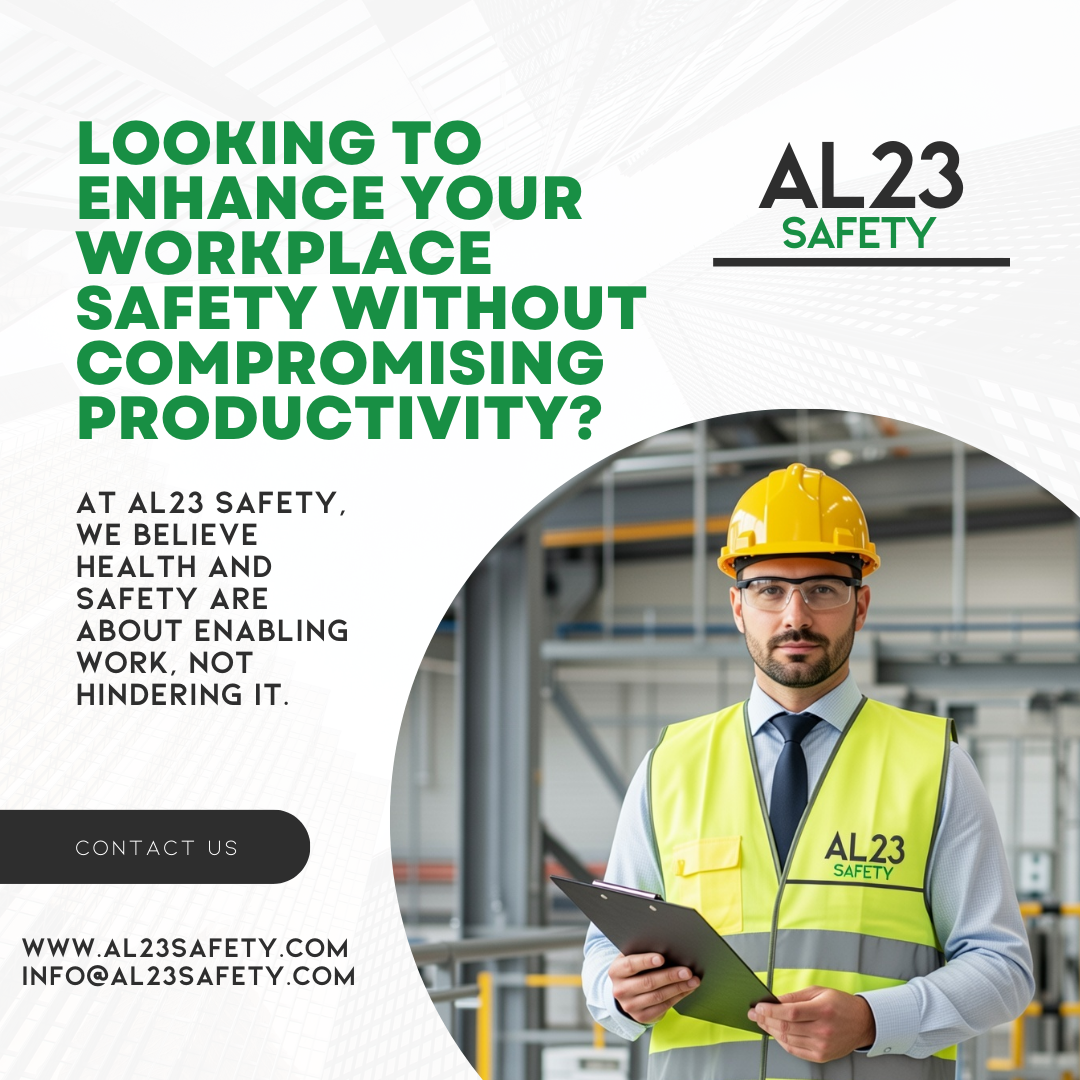Risk assessments are the heartbeat of workplace safety, a non-negotiable foundation for protecting lives and ensuring compliance with UK health and safety laws. The tragic death of Daniel Ames, a director at The British Millerain Company Limited, serves as a heart-wrenching reminder of what happens when risk assessments are overlooked. In January 2022, Mr. Ames was fatally struck while acting as a banksman for a reversing HGV in a Yorkshire warehouse, an incident that could have been prevented with proper safety measures. At AL23 Safety, we are dedicated to helping businesses implement robust risk assessments to prevent such tragedies, fostering workplaces where safety is paramount.
The Health and Safety Executive (HSE) investigation into the incident revealed a glaring absence of risk assessments and safe systems of work for vehicle manoeuvres, leading to a £220,000 fine and £6,234 in costs for the company at Leeds Magistrates’ Court in August 2025. This preventable loss not only devastated Mr. Ames’ family but also exposed systemic failures: untrained staff, no formal procedures, and a lack of oversight for hazardous tasks. HSE statistics show that vehicle-related incidents account for nearly 20% of workplace fatalities annually, underscoring the critical need for rigorous risk assessments in high-risk operations.
AL23 Safety has helped clients across sectors reduce workplace incidents by up to 40% through tailored assessments and training. In this blog post, we’ll unpack seven crucial lessons from the British Millerain tragedy, offering actionable strategies to ensure risk assessments become your workplace’s shield against disaster.
The Devastating Cost of Neglecting Risk Assessments
The British Millerain incident highlights the catastrophic consequences of bypassing assessments. Mr. Ames, acting as a banksman without training, was struck by an HGV whose driver lost sight of him during a reversing manoeuvre. The HSE found no risk assessments or safe work systems in place, violating the Health and Safety at Work Act 1974, which mandates employers to identify and mitigate workplace hazards. This failure led to a life lost, a family’s grief, and severe financial and reputational damage for the company, now implementing safer procedures post-incident.
Risk assessments are not bureaucratic hurdles, they are lifesaving tools that identify hazards, assess risks, and implement controls. Businesses that prioritise them see reduced injuries, lower insurance premiums, and enhanced employee trust. AL23 Safety’s consultancy ensures compliance with UK regulations while embedding safety into your operations, preventing tragedies like the one at British Millerain.
7 Crucial Lessons to Strengthen Risk Assessments
Drawing from the British Millerain case and our expertise, here are seven vital lessons to make assessments a cornerstone of your workplace safety strategy.
Lesson 1: Conduct Comprehensive Risk Assessments for All Hazardous Tasks
The absence of a risk assessment for vehicle reversing was central to the tragedy. Risk assessments must cover all high-risk activities, identifying hazards like moving vehicles and specifying controls such as designated walkways or mirrors. AL23 Safety’s thorough assessments have helped clients like a logistics firm eliminate vehicle-related risks, ensuring safer operations.
Lesson 2: Train Employees on Risk Assessment Outcomes
Untrained staff were a key factor in the incident. Assessments are only effective if workers understand and apply their findings. AL23 Safety’s training programmes, tailored to roles like banksmen, include practical sessions on hazard recognition and mitigation, reducing incident rates by empowering employees with actionable knowledge.
Lesson 3: Implement Safe Systems of Work Post-Risk Assessments
British Millerain lacked a safe system for reversing vehicles. Risk assessments should lead to clear procedures, such as excluding pedestrians from vehicle zones or using technology like reversing cameras. Our consultants design bespoke systems, helping clients like a warehouse operator cut near-misses by 50%.
Lesson 4: Ensure Supervision and Oversight in Assessments
No supervision exacerbated the incident’s outcome. Assessments must include oversight protocols, assigning trained supervisors to monitor high-risk tasks. AL23 Safety integrates supervision plans into our assessments, ensuring accountability and preventing lapses in dynamic environments.
Lesson 5: Foster a Safety Culture Through Risk Assessments
The tragedy highlighted a lack of safety prioritisation. Risk assessments should feed into a broader culture where employees feel empowered to report hazards. We implement feedback systems and safety workshops, helping clients build workplaces where safety is everyone’s responsibility.
Lesson 6: Regularly Review and Update Risk Assessments
Static assessments fail as workplaces evolve. British Millerain’s oversight might have been caught with regular reviews. AL23 Safety conducts periodic audits to update assessments, ensuring they reflect changes like new equipment or staff, keeping safety measures relevant and effective.
Lesson 7: Partner with Experts for Robust Assessments
Complex risks require expert insight. AL23 Safety’s consultants bring deep knowledge of UK regulations, delivering tailored risk assessments that exceed compliance. A manufacturing client avoided HSE penalties by adopting our recommendations, achieving a zero-incident record for two years.
The AL23 Safety Advantage in Risk Assessments
AL23 Safety stands out by offering bespoke risk assessments, training, and ongoing support tailored to your industry, whether construction, warehousing, or retail. Our consultants combine hands-on experience with regulatory expertise, ensuring your workplace meets HSE standards and fosters a culture of safety. Clients we’ve supported report enhanced employee confidence and reduced operational risks, proving that effective risk assessments drive both safety and success.
The British Millerain tragedy is a sobering reminder that neglecting risk assessments can have irreversible consequences. By adopting these seven lessons, businesses can honour Daniel Ames’ memory by preventing future incidents. Don’t wait for a crisis, contact AL23 Safety today to schedule your risk assessment and build a safer, more resilient workplace.



